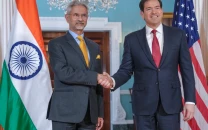‘Indecent’ nuclear proposals
The American nuclear trade dilemma with India is that it let the cow in to feed, but others are milking it

The Indo-US nuclear deal of 2005 opened new vistas for New Delhi and even led to the Nuclear Suppliers Group (NSG) waiver in its favour to trade in nuclear materials and technology with a dozen states. China is the latest suitor of the Indian nuclear dame but does not favour the Indian membership bid for the NSG that would allow it to develop relations at will. This queer development may seem an obvious next step, a surprise and a problem at the same time. It is particularly problematic for those states, which provided opportunities for India but have not benefited from nuclear trade — a vague notion of strategic interests offers some solace in lieu of the anticipated billions of dollars in profit that have not yet started flowing.
Reportedly, Chinese officials have communicated their willingness to offer India civilian nuclear cooperation under India’s current liability law that holds suppliers liable in case of any nuclear accident. Irrespective of this prospective China-India deal coming through, it creates an interesting dilemma for the US. The prospect of a nuclear deal with China provides Narendra Modi a bargaining chip in his dealings with the US and the latter’s leverage would be further eroded.
If the popular perception that India got an American nuclear deal in barter to become a counterweight to China was true, it would be able to cleverly use one suitor’s bid to gain profit from other. Some consider the Indo-US nuclear deal a stillbirth because the prospect of the American nuclear industry’s growth in India does not exist at the moment. The US government cannot afford to pay for Indian liability antics, while China and others can. Owing to the immense power he enjoys, Modi may be able to steamroll the liability law and make an exception for the US like it did in getting India the NSG waiver. Now the US is in indecent haste to get India into the NSG. This is one unique inter-state relationship in which a superpower has entered from the position of disadvantage. It remains to be seen if India blinks on the liability law or if the US continues to reinforce a failure and feed the Frankenstein.
The favours extended to India are irreversible in nature and the US would need some face-saver even if it is symbolic in nature. Even if the US were to reverse the deal with India, other beneficiaries of the deal would not give away the pie. Once the prospects of a nuclear deal were discussed in the Australian parliament in 2012, the driving argument was that even if Australia would not supply uranium to India, states like Kazakhstan or Canada would. The American nuclear trade dilemma with India is that it let the cow in to feed, but others are milking it. Since economic interests are driving the cooperation, it may be naive to assume that the supplier states would give any weight to the voluntary commitments they have given under the ‘informal’ export control regimes.
Japan is the only country that, despite its willingness, has not been able to conclude a nuclear deal with India because New Delhi is unwilling to undertake any obligations related to nuclear tests, which is a red line for Tokyo. It seems that the Japanese are more suave in understanding that beauty is skin-deep indeed. The several ‘indecent’ Indian nuclear deals reiterate that there is no civility in international relations, but Japan has so far proved the maxim wrong.
Published in The Express Tribune, October 3rd, 2014.
Like Opinion & Editorial on Facebook, follow @ETOpEd on Twitter to receive all updates on all our daily pieces.



















COMMENTS
Comments are moderated and generally will be posted if they are on-topic and not abusive.
For more information, please see our Comments FAQ